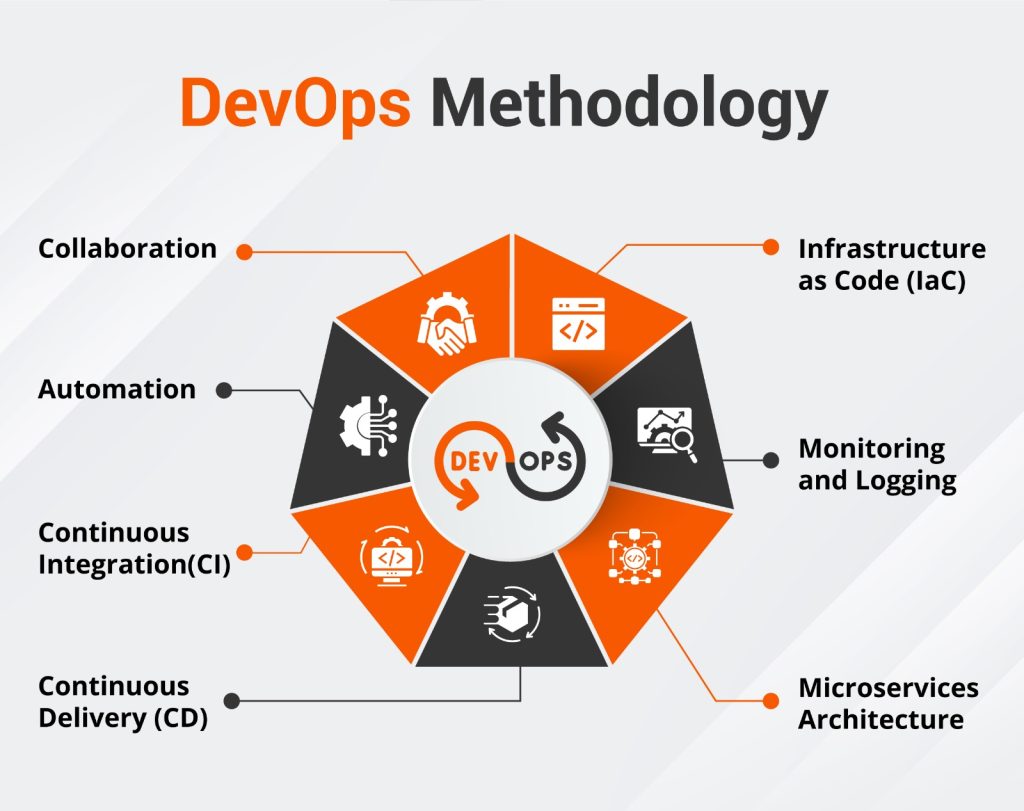Staying ahead means adapting quickly and efficiently. This is where DevOps steps in. But what is DevOps, and why is everyone talking about it? DevOps is a blend of development and operations designed to streamline and speed up software delivery. DevOps ensures faster, more reliable releases by fostering collaboration between developers and IT teams. Imagine releasing updates and new features faster while maintaining top-notch performance. Sounds intriguing, right? Let’s discuss why DevOps is becoming a game-changer for businesses everywhere.
What is DevOps?
DevOps involves collaborative teamwork to swiftly design, develop, and securely deliver software. DevOps practices empower development (dev) and operations (ops) teams to accelerate delivery through automation, collaboration, rapid feedback, and continuous improvement. Originating from Agile software development principles, the DevOps process enhances the cross-functional approach to building and deploying applications more quickly and iteratively.
By adopting a DevOps approach, you commit to enhancing your application’s flow and value delivery by fostering a more cooperative environment throughout the development cycle. DevOps signifies a cultural shift in IT, emphasizing incremental development and swift software delivery, grounded in Agile, lean practices, and systems theory. Achieving success in DevOps relies on cultivating a culture of accountability, improved collaboration, empathy, and shared responsibility for business outcomes.
DevOps Methodology
DevOps integrates software development (Dev) with IT operations (Ops) through a collection of practices designed to accelerate the systems development life cycle and ensure continuous delivery of high-quality software. The DevOps methodology encourages collaboration between development and operations teams to automate and integrate the processes of software development and IT operations. Let’s talk about the fundamental principles of DevOps:

- Collaboration: Enhances cooperation and communication between development and operations teams.
- Automation: Streamlines repetitive tasks to boost efficiency and minimize human error.
- Continuous Integration (CI): Integrates code into a shared repository multiple times daily.
- Continuous Delivery (CD): Ensures the software can be reliably released anytime.
- Infrastructure as Code (IaC): Manages and provisions computing infrastructure through machine-readable definition files.
- Monitoring and Logging: Continuously monitors and logs the system’s performance to detect and address issues promptly.
- Microservices Architecture: This breaks down applications into more minor, manageable services that can be developed and deployed independently.
Must Know Facts About DevOps
- The DevOps market exceeded USD 8 billion in 2022 and is anticipated to expand at a 20% CAGR from 2023 to 2032.
- In 2022, North America topped the DevOps market revenue charts, mainly due to its extensive adoption across IT and telecommunications, retail, and BFSI.
- According to Statista, nearly 47% of respondents reported using a DevOps or DevSecOps approach for software development in 2022.
Why Is It So Important?
Now that we have defined DevOps, let’s investigate why companies have adopted this methodology.
The key reasons driving the development of DevOps include:
- Shorter Development Cycles Encouraging Innovation
The collaboration between development and operations departments accelerates the release of new apps and products. Innovative companies have a higher chance of outpacing their competition, significantly boosting their competitiveness.
- Enhanced Collaboration and Communication
The integration of both teams dramatically improves productivity. DevOps culture maximises performance through team unity rather than individual goals. With both departments working together, the process becomes more streamlined, aiming for a common objective. Fostering a transparent culture where responsibilities are shared, and immediate feedback is ensured is essential to achieve peak performance.
- Reduced Deployment Failures and Faster Recovery
Most development failures stem from programming defects. A DevOps team enables more frequent releases, making identifying and rectifying code defects easier. This collaborative approach also ensures quicker recovery from issues due to all team members’ collective knowledge and involvement during development.
- Improved Resource Management Efficiency
Increased efficiency accelerates development and reduces coding defects. Modern programs can automate many DevOps tasks, decreasing the need for manual labour. This allows software engineers to focus on tasks that cannot be automated.
How could your DevOps team boost efficiency? Our consulting team is here to help. Contact us, and they’ll be happy to assist you.
How to Adopt a DevOps Model
Transitioning to a DevOps model requires several key steps to ensure a smooth and effective implementation. Here’s a detailed guide to assist you in adopting a DevOps approach:
DevOps Cultural Philosophy
Adopting DevOps necessitates a shift in culture and mindset. At its core, DevOps seeks to break down the traditional silos between development and operations teams, fostering collaboration and integration. In some organizations, the same engineers handle both development and operations tasks.
These teams collaborate through DevOps to enhance developer productivity and operational reliability. They focus on frequent communication, efficiency, and improving the quality of customer service. They fully embrace responsibility for their services, focusing on the end customer’s needs and finding ways to meet them.
Quality assurance and security teams often integrate closely with development and operations. Organizations using a DevOps model, irrespective of their structure, have teams that see the entire development and infrastructure lifecycle as their responsibility.
DevOps Practices Explained
Certain key practices empower organizations to innovate rapidly by automating and optimizing software development and infrastructure management. Most of these practices are implemented with the help of appropriate tools.
A crucial practice is to perform frequent, minor updates. This allows organizations to innovate more rapidly for their customers. These updates are generally more incremental than occasional, more significant updates under traditional release practices. Frequent, minor updates reduce deployment risks and allow teams to fix bugs faster by quickly identifying the last deployment that introduced the error. While the frequency and size of updates can vary, organizations using a DevOps model deploy updates far more often than those following traditional software development methods.
Organizations may also employ a microservices architecture to increase flexibility and speed innovation. This architecture decomposes large, intricate systems into straightforward, standalone projects. It segments applications into numerous distinct components (services), each performing a specific role and functioning independently from the other services and the overall application. This reduces the coordination needed for updates. Organizations can move more quickly when small, agile teams manage each service.
However, combining microservices with frequent releases can lead to operational challenges. DevOps practices, including continuous integration and continuous delivery, tackle these challenges by facilitating quick, secure, and dependable delivery. Meanwhile, infrastructure automation techniques like infrastructure as code and configuration management ensure that computing resources stay flexible and adaptable to frequent changes. Additionally, monitoring and logging allow engineers to track application and infrastructure performance, enabling quick responses to issues.
These practices help organizations deliver faster and more reliable updates to their customers.
Your DevOps Toolkit
Besides transitioning from isolated software developers and infrastructure experts to a culture that fosters their collaboration, companies must also grasp several critical practices and tools vital to DevOps. Here are three of the most crucial practices:

Automation: Central to DevOps, automation enhances efficiency by streamlining many slow, labour-intensive processes in software development and infrastructure maintenance. For instance, Amazon highlights the practice of automatically dispatching minor, frequent software updates. This relieves system administrators from manual updates and helps mitigate deployment risks by allowing easier detection and resolution of bugs. Automation is foundational to DevOps and essential for the following practices.
Continuous Integration: DevOps fundamentally promotes close collaboration among engineers and entire teams. Continuous Integration involves engineers regularly sharing and merging their code in a central repository. Previously, developers often worked in isolation for extended periods, merging changes only upon completion. Continuous Integration facilitates smoother collaboration and prevents fragmented development and integration bottlenecks.
Continuous Delivery: Continuous Delivery involves the automatic delivery and implementation of software changes as they occur. It relies on Continuous Integration since code changes can only be efficiently pushed system-wide if housed centrally. Automation is also crucial to Continuous Delivery, as exemplified by the practice of sending minor, frequent updates.
Continuous Delivery allows organizations to implement changes and improvements swiftly, enabling engineers to focus on more complex issues.
Why Choose Nirvana Lab for DevOps
Nirvana Lab is your go-to partner for DevOps, combining expertise with innovation to streamline your development and operations processes. As a Liferay Gold Partner in North America, Nirvana Lab excels in delivering robust, scalable solutions tailored to your business needs. Our team of seasoned professionals leverages cutting-edge tools and practices to enhance collaboration, increase deployment speed, and ensure continuous delivery. By choosing Nirvana Lab, you gain access to a wealth of knowledge and experience, ensuring your DevOps implementation is efficient, cost-effective, and aligned with industry best practices, ultimately driving your business success.
Frequently Asked Questions
What is DevOps and why is it important?
DevOps is a collaborative approach that combines development (Dev) and operations (Ops) to enhance the speed and efficiency of software delivery. It emphasizes automation, continuous integration, and collaboration between development and IT teams. DevOps is essential because it shortens development cycles, improves collaboration, reduces deployment failures, and boosts resource management efficiency, leading to faster and more reliable software updates.
How does DevOps improve collaboration and communication between teams?
DevOps improves collaboration and communication by breaking down silos between development and operations teams. It fosters a culture of shared responsibility, where both teams work together towards common goals. Regular communication and joint problem-solving enhance productivity and ensure that both teams are aligned on project objectives, leading to more efficient and streamlined processes.
How can Nirvana Lab assist with DevOps implementation?
Nirvana Lab offers expertise and innovative solutions to streamline DevOps processes. As a Liferay Gold Partner in North America, Nirvana Lab provides scalable, robust solutions tailored to your business needs. Their team uses advanced tools and practices to enhance collaboration, increase deployment speed, and ensure continuous delivery, helping businesses achieve efficient and effective DevOps implementation aligned with industry best practices.
What are the core principles of DevOps?
The core principles of DevOps revolve around enhancing collaboration and efficiency within software development and IT operations. DevOps emphasizes the importance of continuous integration and delivery, which involves frequently integrating code changes and ensuring that software can be reliably released at any time. It also prioritizes automation to minimize manual tasks and errors.
Infrastructure management through code, known as Infrastructure as Code (IaC), and continuous monitoring and logging are also vital principles. Additionally, adopting a microservices architecture allows for breaking down applications into more minor, independent services, facilitating greater flexibility and faster updates.
What are some standard practices in DevOps?
Common DevOps practices include frequently deploying minor updates to reduce risks and simplify the identification of bugs. Organizations often adopt a microservices architecture to break down applications into manageable, independent services, which enhances flexibility and speeds up development. Continuous integration and delivery practices automate integration and deliver code changes, ensuring rapid and reliable software releases.
Managing infrastructure through code (Infrastructure as Code) and maintaining constant monitoring and logging of system performance are also essential practices that help address issues promptly and maintain system reliability.
